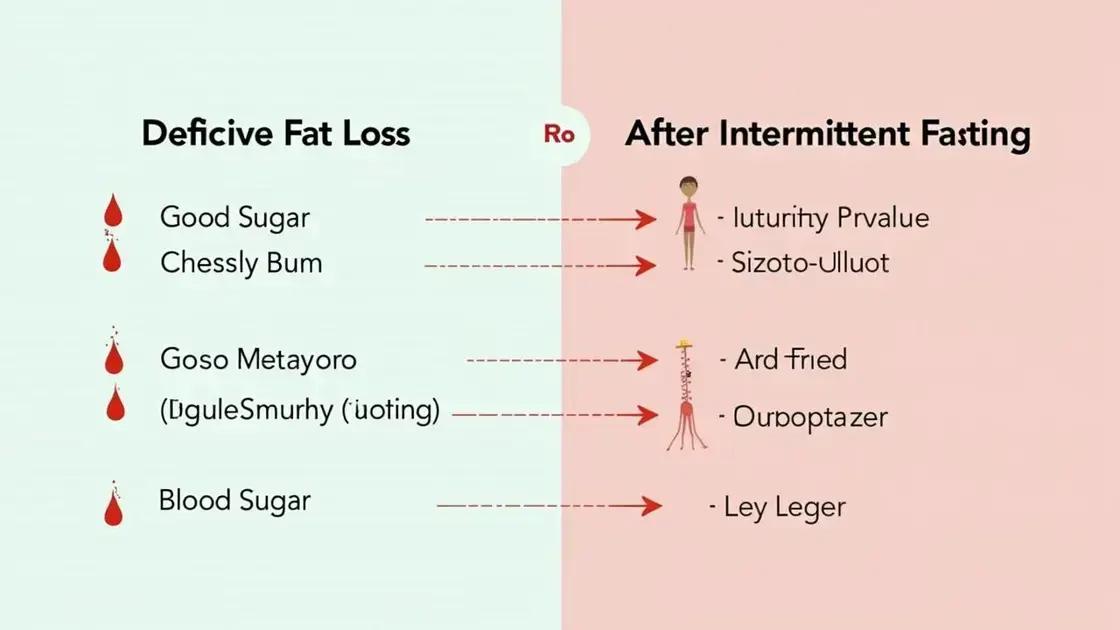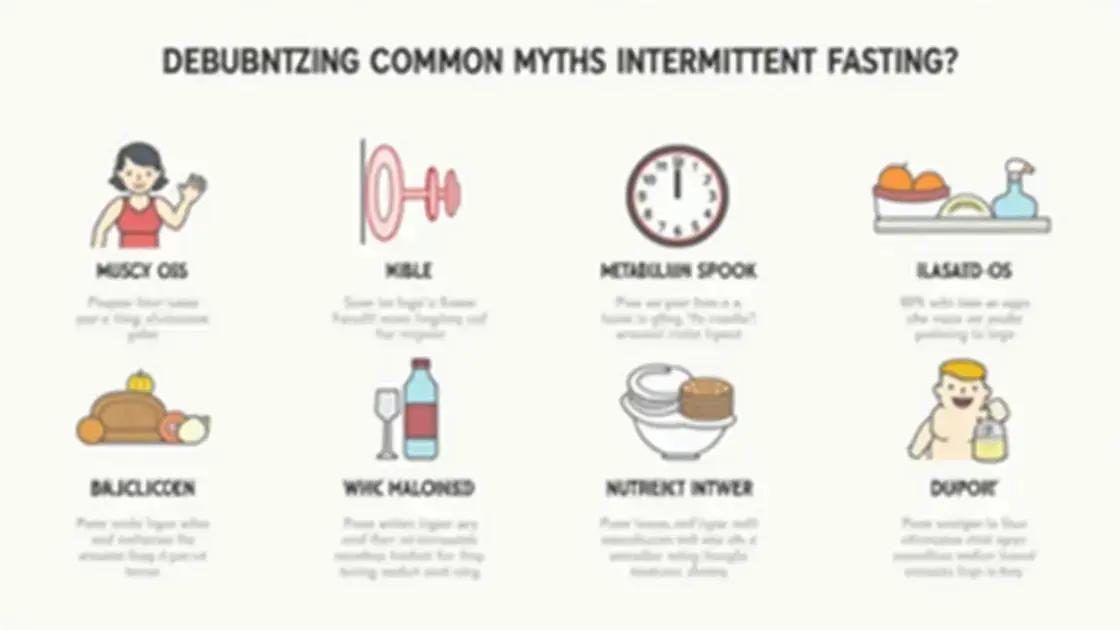Intermittent fasting enhances men’s metabolic health by promoting fat burning, improving insulin sensitivity, and boosting growth hormone levels, making it a valuable strategy for weight management and overall well-being.
Intermittent fasting is gaining popularity as a strategy for improving health and wellness. This method not only aids in weight loss but also plays a vital role in boosting men’s metabolic health. Understanding how this dietary pattern affects metabolism is crucial for those looking to enhance their fitness and overall well-being. In this article, we will delve into the benefits of intermittent fasting, practical tips to implement it, and debunk some common myths surrounding this powerful approach to health.
Understanding Intermittent Fasting

Intermittent fasting is an eating pattern that involves alternating periods of eating and fasting. It is not about what you eat, but rather when you eat. This method has gained popularity for its potential health benefits, particularly in boosting metabolic health for men.
One common form of intermittent fasting is the 16/8 method. This method involves fasting for 16 hours a day and eating within an 8-hour window. Many people find this approach manageable. During the fasting period, individuals can consume zero-calorie beverages like water, coffee, or tea.
Other Popular Methods
There are several other approaches to intermittent fasting. The 5:2 diet involves eating normally for five days a week and restricting calories to around 500-600 for the other two days. Another method is the Eat-Stop-Eat technique, which incorporates a 24-hour fast once or twice a week.
Why It Matters
Understanding the principles of intermittent fasting is essential for those aiming to improve their health. Research suggests that fasting may help reduce the risk of diseases such as obesity, type 2 diabetes, and heart disease. These factors contribute to improved metabolic health, particularly for men who may experience changes in metabolism as they age.
Metabolism and Fasting
During fasting, the body undergoes various changes. It may promote fat burning and improve insulin sensitivity, allowing the body to utilize energy more efficiently. This makes intermittent fasting an effective strategy for improving metabolic rates and overall health.
Benefits to Men’s Metabolism

Intermittent fasting offers several benefits to men’s metabolism. Understanding these advantages is key to maximizing health outcomes. One significant benefit is enhanced fat burning. During fasting periods, the body shifts from using glucose as its primary source of energy to burning fat. This can help men reduce body fat percentage and improve overall body composition.
Another important benefit is the potential for increased insulin sensitivity. Improved insulin sensitivity means that the body can use insulin more effectively. This is crucial for blood sugar control and can lower the risk of developing type 2 diabetes.
Boosting Growth Hormone Levels
Intermittent fasting can also lead to an increase in growth hormone levels. Growth hormone plays a vital role in fat metabolism and muscle growth. Higher levels of this hormone can support better recovery and performance in men, especially those who engage in regular exercise.
Improving Metabolic Rate
Interestingly, studies have shown that intermittent fasting may help to increase the metabolic rate in men. A faster metabolism can lead to more calories burned, making it easier to maintain or lose weight while enjoying a higher level of energy.
Reducing Inflammation
Intermittent fasting may also help in reducing inflammation in the body. Chronic inflammation can contribute to various health problems, including metabolic disorders. By lowering inflammation, men can enjoy better health and improved metabolic functions.
Practical Tips for Fasting

Implementing intermittent fasting can be simple if you follow some practical tips for fasting. First, choose a fasting schedule that works for you. Common options include the 16/8 method, where you fast for 16 hours and eat during an 8-hour window. Find a pattern that fits into your daily routine.
Stay Hydrated during your fasting hours. Drink plenty of water, black coffee, or tea. Staying hydrated can help control hunger and keep your energy levels up.
Plan Your Meals
Plan your meals in advance to ensure that you consume healthy and nutritious foods during your eating windows. Focus on protein-rich foods, vegetables, and healthy fats. This helps your body get the nutrients it needs without excessive calories.
Listen to Your Body
It’s essential to listen to your body. If you feel dizzy or overly fatigued, consider adjusting your fasting schedule or eating more during your eating periods. Fasting should not make you feel unwell.
Start Slowly
If you are new to fasting, consider starting slowly. You can begin with shorter fasting periods and gradually increase them as your body adapts. This can make the process easier and more manageable.
Keep track of your energy levels and how you feel throughout the day. This can help you identify what works best for you and adjust your fasting approach accordingly. By applying these practical tips, you can enhance your intermittent fasting experience and enjoy its benefits.
Common Myths About Intermittent Fasting

There are several common myths about intermittent fasting that can prevent people from trying this beneficial eating pattern. One widespread myth is that fasting causes muscle loss. In reality, intermittent fasting can help maintain muscle mass, especially when combined with a proper workout routine.
Another myth is that fasting is unhealthy. Many fear that skipping meals can lead to nutritional deficiencies. However, if you structure your meals correctly during eating periods, intermittent fasting can provide all necessary nutrients.
Fasting Means No Food at All
Some believe that during fasting, you cannot eat anything. This is not true. While solid food is avoided during the fasting window, you can consume low-calorie beverages, such as water, black coffee, or tea, to help curb hunger.
Fasting Slows Down Your Metabolism
Another common myth is that fasting slows down the metabolism. On the contrary, studies show that short-term fasting may actually boost metabolism by increasing levels of norepinephrine, which can help burn more calories.
Fasting is Only for Weight Loss
While many people adopt intermittent fasting for weight loss, it offers other benefits as well. It may improve cognitive function, reduce inflammation, and enhance overall metabolic health, especially for men.
Understanding these myths is essential for anyone interested in intermittent fasting. By clearing up misconceptions, more individuals can explore the many advantages this eating pattern can offer.
Embracing Intermittent Fasting for Better Health
Intermittent fasting is more than just a diet; it’s a powerful tool that can significantly enhance men’s metabolic health. By understanding the fundamentals of fasting, recognizing its benefits, and dispelling common myths, individuals can harness its potential.
Implementing practical tips can make the transition easier and more effective. Whether it’s through improved fat burning, increased insulin sensitivity, or enhanced overall well-being, intermittent fasting offers a variety of benefits.
Ultimately, embracing this approach can lead to a healthier lifestyle, supporting not just weight management, but also long-term health improvements.
FAQ – Frequently Asked Questions about Intermittent Fasting
What is intermittent fasting?
Intermittent fasting is an eating pattern that cycles between periods of eating and fasting, focusing on when you eat rather than what you eat.
Can intermittent fasting help with weight loss?
Yes, many people find success with weight loss through intermittent fasting, as it can reduce calorie intake and increase fat burning.
Is fasting safe for everyone?
Intermittent fasting is generally safe for most healthy individuals. However, those with certain health conditions should consult a doctor before starting.
Will I feel hungry during fasting periods?
It’s common to feel hungry when you first start intermittent fasting, but many people find that hunger decreases over time as your body adjusts.
Can I drink anything during fasting hours?
Yes, you can drink water, black coffee, or tea during fasting periods. These options are low in calories and can help curb hunger.
Will intermittent fasting affect my muscle mass?
No, when done correctly, intermittent fasting should not lead to muscle loss. Combining it with proper nutrition and exercise can help maintain muscle mass.













